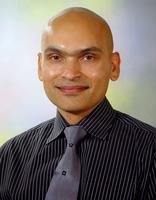 "You can enable ubiquitous [wireless health] sensing, but without a services and disease management workflow system in place, who is this data going to?" Duke University Adjunct Associate Professor Gopal Chopra explained to Mobihealthnews in a recent interview. "Who will interpret it? If there are algorithms involved with telling users what to do, well, who is overseeing that? There's risk in that. You need a care provider to be overseeing it, which then leads us back to who is going to pay for it? I don't think sensors are the only answer."
"You can enable ubiquitous [wireless health] sensing, but without a services and disease management workflow system in place, who is this data going to?" Duke University Adjunct Associate Professor Gopal Chopra explained to Mobihealthnews in a recent interview. "Who will interpret it? If there are algorithms involved with telling users what to do, well, who is overseeing that? There's risk in that. You need a care provider to be overseeing it, which then leads us back to who is going to pay for it? I don't think sensors are the only answer."
Chopra certainly has opinions about the emerging wireless healthcare industry. Besides teaching health data management to Duke University MBA students, Chopra is also building two wireless healthcare start-ups and is one of the lead organizers of Duke University's Medical Innovation and Strategies Conference 2009 on Wireless and Consumer Health.
Read on for highlights from Mobihealthnews' interview with Gopal Chopra.
Can you give us a brief background about your position at Duke University and past experiences?
My quick background is: Neurosurgeon-turned-entrepreneur. Most recently I was an investment banker, but ever since I got my MBA, I have been on the faculty of the health sector management program at Duke University's Fuqua School of Business. I am an associate professor that teaches the elective course in health data management for the full-time MBA students. Outside of that I have been in business development at Boston Scientific, in investment banking, and now I am an entrepreneur.
The event you are producing and your current area of interest is "wireless & consumer." With all that is going on in healthcare right now, why did you choose this focus?
Two reasons -- one is personal. I spent the last 15 plus years in and around medical devices working or advising the likes of Johnson & Johnson, Stryker and others, while watching the market for implants grow. I understood we were supplying implants and technology to a chronic disease market. The health costs just continue to escalate. As a result, we began looking for better solutions and at the stickiness of products that involve medical devices but also services. Then in the last five or six years some companies have come forward and made the services side very interesting.
What are some examples?
One example is the MEMS technologies that Medtronic is using to understand blood pressure and arrhythmia in order to prevent re-admission either in cardiac rhythm management or cardiac failure. Jim Sweeney [founder of CardioNet] is a close friend, and watching him struggle to get CardioNet up and running, has shown it's possible. That company became a huge success because of the reimbursement and the support around data and event capture that Sweeney's team finally proved.
We are all learning very quickly that this is a new segment that is being created -- one that even capital markets have not yet defined. Investors have not yet defined it. Clearly, though, innovators have merged technologies and services and enabled this mobile health with wireless technology. The wireless healthcare term was coined around a lot of these efficiency solutions. I looked at all of that and said that, as did many others, that this is a big opportunity. Hopefully we are the first few to realize that this is a big opportunity. It will have a significant impact on healthcare. So that's the first reason we decided on wireless and consumer as a focus.
Then, the academic side of me wants people to focus on this because wireless technologies companies need healthcare expertise and medical device makers need wireless expertise. We want to bring these two industries together. And as an investor and entrepreneur in this space, I'm interested in helping companies in this space. I'm currently working with a wireless solutions operating room asset management start-up. I'm also interested in building companies -- I'm building [one start-up] for the pediatrics field. There are a lot of verticals and niches where we can create a lot of value, improve outcomes and create mobile remote health.
Can you tell me more about these start-ups that you are involved with? They are wireless-enabled?
Yes, they are wireless health related. One is for managing operating rooms. It's more than scheduling: It's asset management logistics. It's looking at the human resources, the tools, the inventory, and just-in-time event management of what happens in an operating room, which is very complex. To be able to do that you need everyone from an operating room manager all the way through to the lead surgeon, wirelessly connected with real-time information about what is happening on the floor.
The one I am currently building, which I am launching rather shortly, is in pediatrics. Very briefly, it's just taking a primary care problem that is abused both on the consumer and physician side of it. In a highly burdened primary care system with not enough physicians and not enough access, too many things could be intervened in and prevented at an earlier time point. [The problem we are solving is] a classical child situation -- they typically don't tell you or warn you about a medical event. These events often incubate for a little while, and sometimes until it's too late. That's a perfect case for a wireless sensor that can connect the data to a care provider who can analyze the data and prevent a problem well before the emergency care services need to become involved.

















